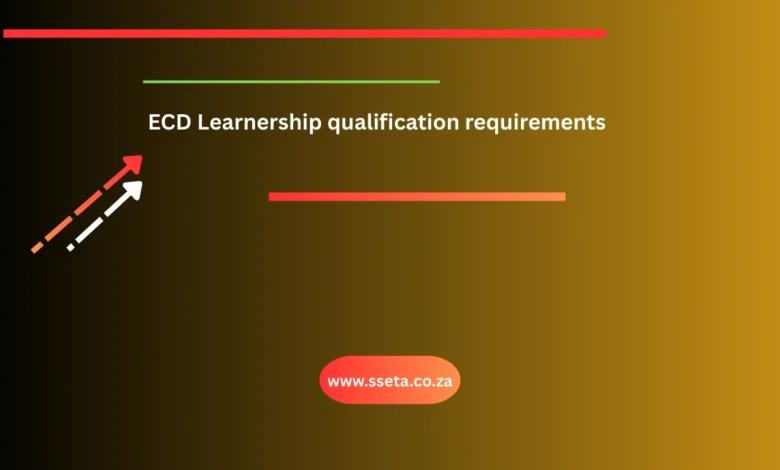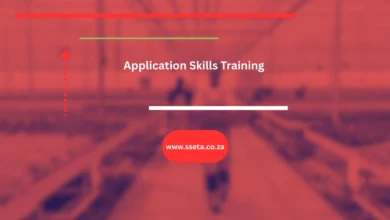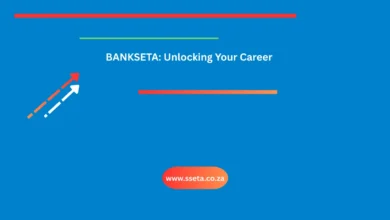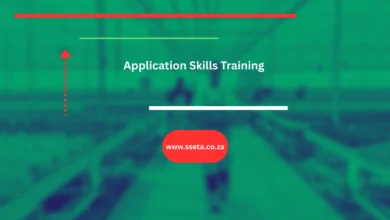Unlocking Your Future in Early Childhood Development (ECD): What are ECD Learnership qualification requirements?

What are ECD Learnership qualification requirements?? Early Childhood Development (ECD) is one of the fastest-growing fields in South Africa, offering young people a chance to build a meaningful career while making a difference in their communities. With the government’s focus on strengthening early childhood education, there has never been a better time to explore this career path.
But many aspiring professionals ask:
👉 What qualifications do I need for an ECD learnership?
👉 What study options are available?
👉 How do I grow my career in this sector?
This guide provides a step-by-step roadmap—covering entry requirements, learning pathways, bursaries, and career opportunities—so you can confidently plan your future in ECD.
🎓 What Are the Qualification Requirements for an ECD Learnership?
To apply for an ECD learnership, candidates typically need one of the following:
- ✅ National Senior Certificate (NSC) – also known as a matric certificate.
- ✅ Senior Certificate (SC) – awarded before the introduction of the NSC.
- ✅ National Senior Certificate for Adults (NASCA) – designed for adult learners.
- ✅ Level 4 National Certificate (Vocational) – with a diploma entry endorsement or equivalent qualification.
ECD Learnership qualification requirements
👉 In short: If you’ve completed Grade 12 or an equivalent qualification, you are eligible to apply for most ECD learnerships and training programmes.
💡 Tip: Even if you don’t meet all the requirements, some training providers may still consider applicants with relevant work or volunteer experience in childcare, community work, or teaching support.
📘 What Will You Learn in an ECD Qualification?
ECD training is designed to equip you with practical teaching skills and theoretical knowledge. Depending on the level of study, you will cover areas such as:
- 🧩 Child development psychology – understanding how children learn and grow.
- 📚 Learning programme design – planning age-appropriate lessons and play-based learning.
- 🏫 Classroom management – creating a safe and stimulating learning environment.
- 🤝 Community engagement – working with parents and caregivers to support child development.
- 📊 Assessment skills – tracking and reporting on children’s progress.
By the end of your learnership or qualification, you will be ready to work in ECD centres, preschools, or even start your own childcare initiative.
📈 ECD Career Path: Where Can This Qualification Take You?
One of the biggest advantages of ECD is the variety of career options available after completing your studies. Here’s how your career can progress:
🔹 Entry-Level Roles (After Level 4 Qualification)
- ECD Practitioner / Teacher Assistant
- Playgroup Facilitator
- Aftercare Supervisor
🔹 Mid-Level Roles (After Level 5 or Diploma)
- ECD Centre Teacher
- Curriculum Coordinator
- Childcare Programme Manager
🔹 Advanced Roles (After Degree or Postgraduate Study)
- ECD Centre Director / Principal
- Policy Advisor on Early Learning
- Researcher in Child Development
- Lecturer in ECD Education
🌍 Career Impact: With South Africa’s National Development Plan highlighting ECD as a priority sector, professionals in this field are in high demand. By investing in this career path, you not only build your own future but also contribute to the growth of communities and the economy.
🏫 Study Options for ECD in South Africa
If you’re passionate about early childhood education, you’ll be glad to know that there are multiple study routes available. These include short courses, learnerships, diplomas, and degrees.
1️⃣ National Certificate: ECD (NQF Level 4)
- 📍 Offered by many TVET colleges and accredited training providers.
- 💡 Perfect for beginners entering the sector.
- 🎯 Focuses on classroom support and basic childcare skills.
2️⃣ Further Education and Training (FET) Certificate in ECD (NQF Level 4 & 5)
- Equips learners with practical teaching skills.
- Provides opportunities for employment as an ECD practitioner.
3️⃣ Diploma in Grade R Teaching (NQF Level 6)
- 🎓 Offered by universities such as UNISA.
- Prepares you to teach Grade R learners in formal schools.
4️⃣ Bachelor of Education (BEd) in Foundation Phase Teaching
- 📚 A 4-year university programme.
- Enables graduates to teach learners from Grade R to Grade 3.
5️⃣ Postgraduate Opportunities
- Master’s or PhD in Early Childhood Education.
- Ideal for those pursuing research, policy, or leadership roles.
💰 Funding and Bursaries for ECD Studies
Pursuing a career in ECD doesn’t have to be expensive. South Africa offers several funding opportunities for aspiring educators:
- 🎓 National Student Financial Aid Scheme (NSFAS) – covers tuition, accommodation, and study materials for eligible students.
- 🌍 FUNZA LUSHAKA Bursary – specifically for teaching qualifications, including foundation phase education.
- 🏢 SETA Learnerships – such as those offered by the Education, Training and Development Practices SETA (ETDP SETA).
- 💼 Private Bursaries – some NGOs, corporates, and trusts provide bursaries for students pursuing ECD.
💡 Pro Tip: Always check deadlines early. Many bursaries open applications between August and September each year.
📊 Why Choose a Career in ECD?
Here are some of the top reasons to consider ECD as a career:
- ❤️ Impactful Work – You’re shaping the future of young children.
- 📈 Growing Demand – South Africa is investing more in early learning.
- 💼 Stable Career Path – Schools, ECD centres, and NGOs are always hiring.
- 🌍 Community Development – You play a vital role in uplifting families.
- 👩🏫 Continuous Growth – Opportunities for further study and specialization.
📌 How to Apply for an ECD Learnership in South Africa
If you’re ready to take the first step, here’s a simple guide to applying:
- Check Entry Requirements – Ensure you meet the minimum qualifications (NSC, SC, NASCA, or Level 4 NCV).
- Choose a Study Route – Decide between a learnership, diploma, or degree.
- Research Accredited Institutions – Look for training providers registered with ETDP SETA or the Department of Higher Education.
- Prepare Your Documents – Certified copies of ID, matric certificate, CV, and proof of residence.
- Apply Online or In Person – Visit the institution’s website or contact their admissions office.
- Seek Funding – Apply for NSFAS, Funza Lushaka, or SETA bursaries to cover costs.
- Stay Updated – Follow official announcements and deadlines to avoid missing opportunities.
🎯 Final Thoughts: Is ECD Right for You?
A career in Early Childhood Development is more than just a job—it’s a calling. If you are passionate about teaching, patient with children, and motivated to uplift communities, this field could be the perfect fit for you.
With flexible study options, strong government support, and growing demand, pursuing an ECD qualification opens the door to a rewarding career with impact.
📌 Key Takeaway:
- The minimum entry requirement is a matric (NSC) or equivalent.
- Multiple study pathways exist—from certificates to postgraduate degrees.
- Financial aid is available through NSFAS, Funza Lushaka, and SETA learnerships.
- Career opportunities are diverse and in high demand.
🌟 Visual Inspiration (For Your Website)
To make this content visually appealing and engaging, here are some visual content ideas:
- 📷 Infographic: ECD Qualification Pathway (Level 4 → Diploma → Degree → Postgraduate)
- 🎥 Short Video Clip: A Day in the Life of an ECD Teacher
- 🖼️ Images: Children in interactive play-based classrooms
- 📊 Chart: Projected Growth of ECD Jobs in South Africa
Adding these visuals not only enhances user experience but also improves Google AdSense approval chances by making your site informative and engaging.



